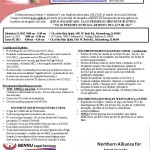Today, I posted the following idea to the Federal Partners in Transition discussion mentioned last week. I propose development of a network of local information clearinghouses similar to TheNemoNews. In support of this idea, I also developed a brief FAQ that is now on the website. (http://www.thenemonews.com/about/faq)
If you have found TheNemoNews helpful, and believe it bears development, I would appreciate your vote on the website. The discussion ends on May 27, and this entry has been posted towards the end of the discussion.
Local Information Clearinghouses
88% of those with DD live at home according to a recent study. They and their families are ill-equipped to navigate the maze of programs services and opportunities that are available locally. Many are poor, ill informed, overwhelmed and/or isolated. The internet provides a way to develop “hyperlocal” information clearinghouses that serve localities and could be built into a national network. These could deliver news using social media, internet and mobile technologies. I would like to see the federal system develop a network of information clearinghouses that are local, family-oriented and ground-up in approach.
In Lake County, Illinois, a parent began http://www.TheNemoNews.com to address local needs for information. It targets the (young) and adult community and their families by posting news briefs that are cross-agency, objective, and permission-based. A business plan in in progress. For more information please go to: http://www.thenemonews.com/about/faq
Now in its second year, TheNemoNews.com has learned a great deal about what it takes to deliver the news. While facing cultural and technical challenges, I envision a network of local news services that provide individuals with access to information and resources that are within reach.
Thanks for your support!


